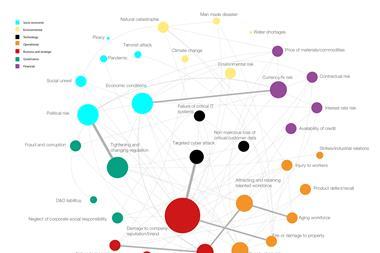Zimmermann on the top risks for German risk managers and how to cope with those challenges

Q. What do you think are the major challenges facing German risk managers?
A. If we are talking about Insurance Risk Manager and not those administering the Enterprise Risk Management process, then to answer your question, German insurance risk manager are increasingly faced with challenges coming out of their own corporate organisation. These are mainly driven by the mature business model in insurance. As insurance proceedings have reached a level of commodity since many years additionally driven by a long lasting competitive market environment, insurance is more and more understood as cheap and simple. Therefore the relevance of insurance becomes under-evaluated and loose recognition in corporate organisation. And there is also no support from the market. There is no convincing sign neither from broker nor from insurer to demonstrate the relevance of insurance and more important to provide business solutions being enabler of the corporate business. It is not visible that they respond to the finance language of the current generation of CFOs.
Q. What advice do you have for meeting these challenges?
A. Communication, transparency, education, improved procedures and workstreams are key not only for Insurance Risk Manager but more important for the markets. A common wake-up call is necessary to clearly address the exposures to which insurance solutions are responding as business enabler. Skills are necessary enabling the stakeholder to better respond to finance methodologies and priorities of the corporate CFO’s community. Mature marketing models like “insurance protects the balance sheet, covers risks a company is faced with” are not accurate and not relevant. The entire scope of risks a corporation is faced with is on the screen of today’s CFOs and CEOs. As far as they can be quantified the management has a pretty good estimation what their real risks are. They can be substantially far away from that what insurer are providing. However, like other finance tools (e. g. hedging, corporate bonds) should insurance requalify as finance solution providing substantial predictability for identified finance exposures. It is not naive to say that insurance is the most complex hedging procedure and therefore one of the key business enabler and as such relevant.
Q. How important is innovation in the insurance market? Is the market innovating enough? And if so, in what areas?
A. For me innovation means the entire setup of the insurance market. Improved skills as mentioned above, a much more better marketing from insurer dedicated for corporate risks and of course insurance solutions better responding to insurable exposures of today. Yes it is important.
If you see a huge ship maneuvering, you can get a pretty good feeling how long it lasts to confirm that insurer are innovative enough. And I do not see so many ships turning. However, there are signs and a few commitments leading to innovation.
Non-physical BI for instance is a good example. Unfortunately the marketing was weak. Negotiations and very few commitments for non-occurrence insurance are on the screen but again a strategic business model is not at the horizon.
Q. What could be done to further improve the conversation between insurers and risk managers? Why is this important?
A. Let me answer the second part of your question first. I believe that I already addressed the importance in answering your questions above. The answer to the first part of your question is a bit more complex. As the behavior of insurance markets and corporate finance communities is potentially more and more departing from each other, it is necessary to assess why and to which extend. An adequately developed strategy is necessary to find out how to restore the platform of equal understanding of each other.
Q. What do you see as the main challenges for insurers going forward?
A. The continuation of fresh capital invested into the insurance market leads to further price reductions. The turnaround of the capital markets leading to higher interest rates is difficult to predict. In this environment brokers are pushing insurers hard for further price reductions. This is why insurers are reluctant to establish convincing initiatives to adjust their business model. As a consequence it may be not the time for them to release innovative products and adjust their marketing strategy. However, as the markets are still profitable as we have seen in the previous years they should review their business model now to anticipate future challenges. Ideas are there…
Ingo Zimmermann, senior-vice president and head of airbus group insurance risk management, Airbus Group




















No comments yet